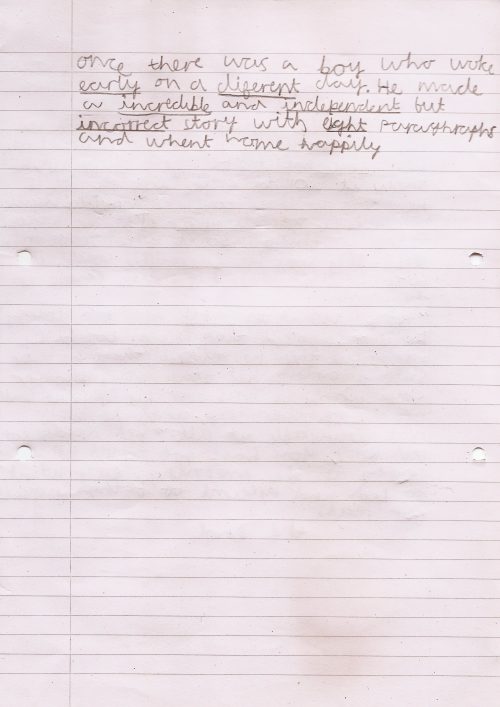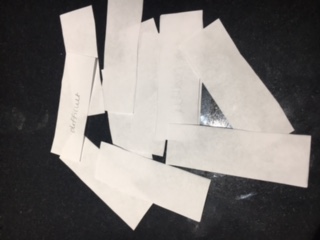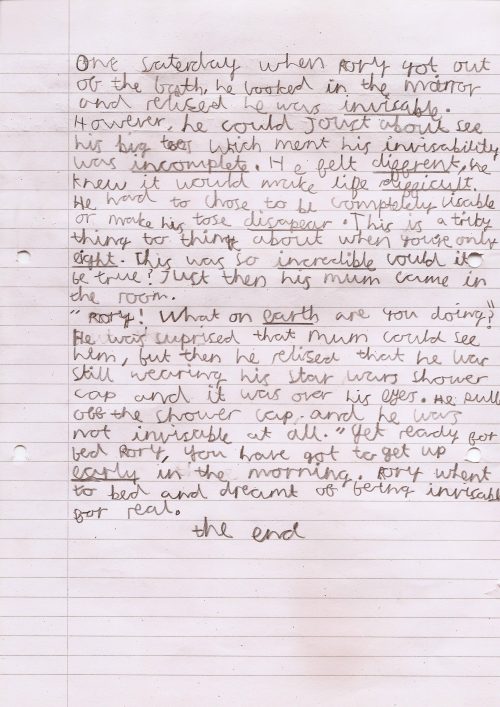For reluctant writers, the mere mention of story writing is enough to bring them out in a cold sweat.
I know from experience that my own little reluctant writer will do the minimum he can get away with when it comes to English homework. He might have ideas, but he won’t follow them up or develop them in any way because it just seems like too much hard work.
We’ve looked at journaling, which is something I’ve mentioned previously. Getting into a regular writing routine does help, but at the same time, it adds to whatever work the child may have already been asked to do at home. Sometimes that can be enough to content with.
This week, my son was tasked with writing a story using as many words from his spellings’ list as he could manage to fit in. Five minutes after he had gone into the study to sit at the desk, he came out claiming he had finished.
‘You can’t have written a story already?’ I said.
‘I have,’ he replied, in his indignant fashion. ‘They said it had to be a short story and that’s what I’ve done.’
He showed me.
It was short indeed.
So short, it amounted to just two sentences.

Translation: “Once there was a boy who woke early on a different day. He made an incredible and independent but incorrect story with eight paragraphs and went home happily”.
You can see the words he used from the spellings list, as they are underlined. In all fairness to him, he managed to squeeze a good few in there, but really, this just shows how the mind of a reluctant writer works.
Then came the heated discussion about what counts as a short story, my ten year old pointing out it should be more like one side of A4.
‘That’s not short,’ my son said, clearly horrified at the thought.
We explained a long story would be more like three to four pages of A4, nearer to one page was what he should be aiming for.
At this point his face dropped and I knew I was going to have to help him out, so I came up with a plan and this is what we did:

I put each of the spellings on a piece of paper and turned them over so we couldn’t see what they were.
After asking my son to decide on a character and give it a name, I got him to turn over one of the words and write an opening sentence with that word in it.
And so this continued, with the rules being you didn’t have to use the word if you couldn’t think of a way to use it in order to move the story on. This happened once.
By the time he’d finished his story, my son had used most of the words from the spellings list and completed three quarters of a page of writing. I had one very proud son who couldn’t believe how I had made it so easy (they were all his ideas, but with my guidance).
I think you will agree the story he came up with is a huge improvement on his first attempt.

Translation: “One Saturday when Rory got out of the bath, he looked in the mirror and realised he was invisible. However, he could just about see his big toes which meant his invisibility was incomplete. He felt different, he knew it would make life difficult. He had to choose to be completely visible or make his toes disappear. This is a tricky thing to think about when you’re only eight. This was so incredible, could it be true? Just then his mum came in the room “Rory, what on earth are you doing?” He was surprised that mum could see him but then he realised that he was still wearing his star wars shower cap and it was over his eyes. He pulled off the shower cap and he was not invisible at all. “Get ready for bed Rory, you have got to get up early in the morning.” Rory went to bed and dreamt of being invisible for real. The end.”
If you have reluctant writers, perhaps this is worth trying next time they are stuck for what to do or are digging their heels in and refusing to do anything at all. This game is a variation of one where you go round the room and each person has to add the next part of the story. However, in this case, having one word as a focus for each sentence has a unique way of narrowing down your thoughts and forcing you to think around that word. In many ways, this works for reluctant writers because it gives them an opportunity to move the story on without them having to work from a barrage of ‘free flowing’ ideas that might be floating around in their heads.
If you try it and it works for you too, please let me know!

I used to play that game when I taught English in Korea. 🙂 I love those kinds of activities. I think that I’ll need to start using some writing prompts soon. Once I get this art finished that I’m making, I plan on trying to start a writing routine. Do you have any tips on getting started?
Buy yourself a nice new notebook and pen. That’s always inspiring. Also, book yourself a slot as part of your weekly routine, even if it’s only an hour.